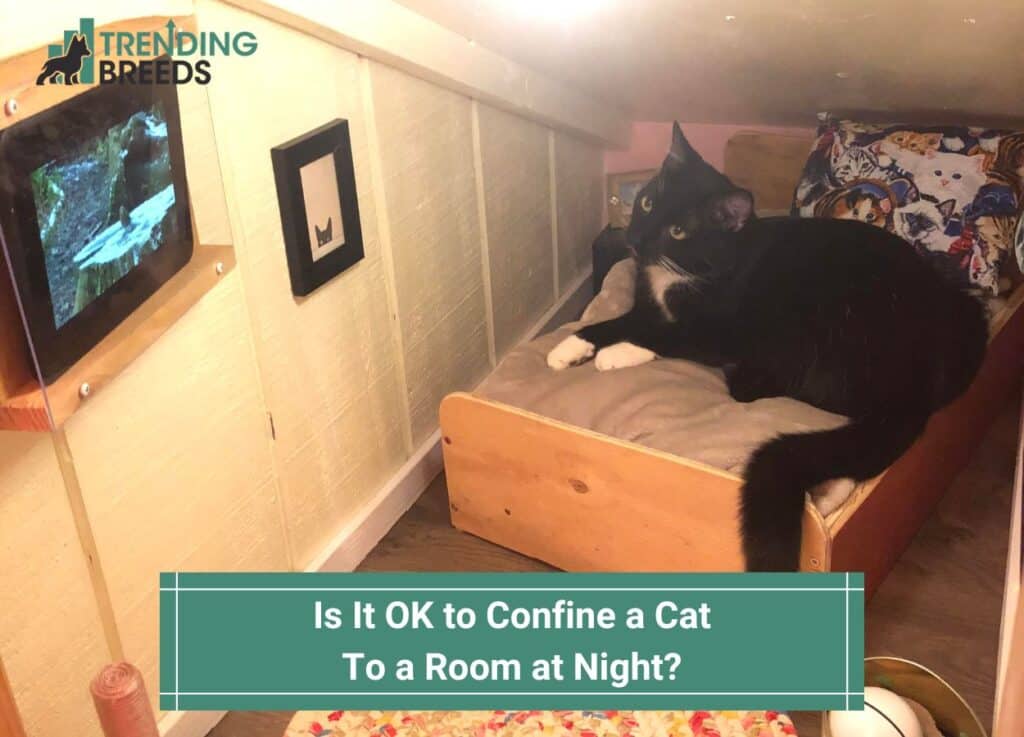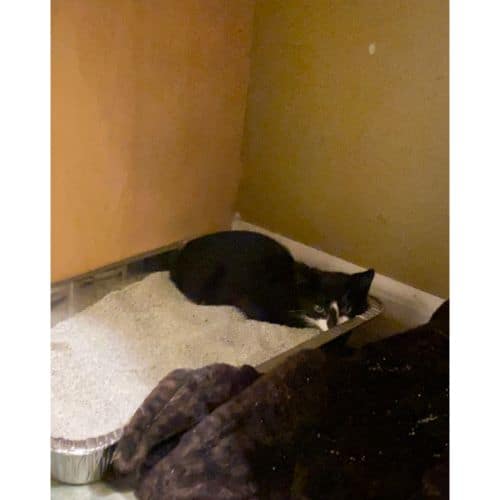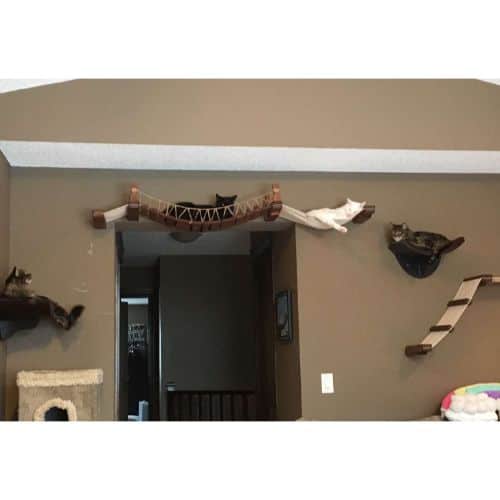
If you’re a cat owner, you’ve probably spent some nights tossing and turning, wondering whether it’s best to confine your feline friend to a room or let them run the house.
The question is important, especially with both sides having compelling arguments.
Yes, it is okay to confine a cat to a room at night. However, that depends on whether there’s an actual reason for keeping them in a more open space.
In the long term, confining them can cause them to develop stress and anxiety.
In this article, we will go over whether it is ok to confine a cat to a room at night and what you should do about it.
Before you scroll further down this guide, check out these other cat-related articles: Can Cats Eat Dates? and When to Euthanize a Cat with Seizures?.
Is It Safe To Confine My Cat At Night?

Confining your cat to a designated single room is not just about limiting their movements. It is about creating a safer environment for them.
Cats are innately curious creatures, and that curiosity won’t take a break because it’s dark outside.
Imagine your cat navigating through your living space at night: exposed electrical outlets and fragile items on shelves. Even small objects that could be swallowed present risks.
In a confined, cat-proofed room, you can control these variables to ensure the space is free from hazards like toxic plants or chemicals.
This controlled environment becomes a sanctuary, not a prison, keeping your pet safe while you sleep soundly. So, yes, it is safe to confine your cat at night.
In fact, we’d recommend keeping your cat confined solely because of the added safety of knowing your feline friend will be in a controlled environment.
Does My Cat Sleep Better When Confined?

Yes, you and your cat will sleep better when confined. Cats are nocturnal in nature.
Their natural tendency to be awake and active during these times can conflict with our human sleep patterns.
Your cat’s zoomies or predilection for jumping around and disturbing your sleep can get a bit agitating if they’re in the same space as you.
So, besides just ruining your sleep, not being able to provide them with an environment to go all out can disturb both your cognitive function and your overall well-being as well.
By confining your cat to a room, you create a dedicated space where they can play, scratch, or even run without interrupting your space.
Also, as we’ve mentioned, cats benefit from a stable sleep environment. A confined space can become a comforting, familiar place.
The Pros of Confining Your Cat to a Room

Before we talk about the cons, here’s a list of pros that you need to keep into account if you are deciding to confine your cat to a room.
Ease of Training
Bringing a new cat into your home, especially if it’s a kitchen or an adopted cat, comes with a learning curve.
A confined space is a classroom where you can focus on learning essential behaviors.
So, if you have a new cat, consider litter training a prime example.
In a confined room, the litter box is readily accessible, reducing the likelihood of accidents elsewhere.
This confined space will minimize distraction, making it easier for your cat to associate the litter box with its natural needs.
In essence, you can make a more focused environment that simplifies and accelerates the training process.
Controlled Feeding

Ever tried free-feeding a cat in a house with multiple pets? You already know the challenges that can bring then.
Dogs often take advantage of the readily available cat food. Or, one cat might dominate the food bowls, leaving the others with less.
Confining your cat to a room at night can provide a straightforward solution to these challenges.
In this controlled setting, you can monitor your cat’s eating habits closely. This ensures they get the proper amount of food.
This is especially critical if your cat is on a special or needs to take medication mixed with its food.
Monitoring food intake can also provide early indicators of health issues, such as changes in appetite, allowing for timely veterinary intervention.
Reduced Stress
The dynamics between pets can sometimes be less than peaceful.
Dogs, in particular, might see the cat’s nocturnal activities as a cue for play or, worse, a trigger for their prey drive.
Confining your cat to a room at night can be a stress-reduction mechanism for other pets.
By providing each pet with its own space, you reduce the potential for overnight skirmishes or stress-induced behaviors, leading to a more peaceful home for everyone involved.
The Cons of Confining Your Cat to a Room

It is not all rainbows and roses. Confining your cat to a single room also has some negative side effects. Here’s a look at some of them
A Chance of Higher Stance Levels
This may seem ironic, but we’ve just talked about reduced stress between your pets.
At first glance, a confined space may seem like a haven for your cat, but for some cats, this limited environment can become a source of stress and anxiety.
Cats are territorial animals, and limiting their space can make them feel constrained or trapped.
Over time, this stress can manifest in various ways, such as excessive grooming, vocalization, or even destructive behavior like scratching at doors or walls.
This psychological toll shouldn’t be underestimated since chronic stress can also lead to long-term health issues, such as urinary problems or digestive issues.
Lesser Physical Activity

Cats are agile. They naturally wish to climb, jump, and explore. Confining a cat to a room, especially a small one, can limit these activities significantly.
This lack of exercise can have severe negative effects, including weight gain and muscle atrophy.
This lack of stimulation can also lead to boredom, causing your cat to engage in undesirable behaviors like scratching furniture or making loud noises just to entertain themselves.
Plus, your relationship with your cat isn’t just based on you feeding them or playing with them.
It is, in essence, based on trust and mutual trust. If you end up confining your cat in a room for extended periods, it may signal to the cat that it is being punished or isolated.
Cats are great at picking up on human emotions and changes in routine. As a result, the confined cat may become more aloof or even display signs of aggression towards you.
This confined environment could be a wedge between you and your cat, straining the relationship over time.
Lack of Observation
One advantage of allowing your cat to roam freely is the ability to observe their behavior. Behavioral changes are often the first indicators of underlying health issues.
A cat in a separate room might display symptoms like changes in eating habits, litter box usage, or even changes in how they meow that you might not be able to observe.
Early detection and discovering of symptoms like these can be crucial for effective intervention.
By confining your cat to a room at night, you may delay recognizing these early signs, potentially leading to more severe medical issues.
If you have more than one pet, confining one can ripple effect on the entire household’s dynamics.
For instance, if you have more than one cat, confining one might make the other feel either emboldened to claim more territory or stressed because they miss their companion.
Similarly, dogs in the household might become agitated, sensing the cat’s confinement as a change in the household hierarchy.
In multi-pet households, confinement isn’t just about the cat; it’s a decision that impacts all pets and could lead to unintended behavioral issues across the board as well.
Is It OK to Confine a Cat to a Room at Night?

Confining a cat to a room is generally okay, given that you aren’t doing it for an extended period and have a solid reason to do so.
Generally speaking, you should try and integrate the cat into your lifestyle such that you don’t need to confine them.
Or, find the root cause of the issue that led you to think about confining them.
Having a pet is all about sharing vulnerabilities and developing mutual respect.
There’s no better time to do so when you and your cat are sound asleep together!
If you find this guide, “Is It OK to Confine a Cat To a Room at Night,” informative and helpful, you can check out these other cat-related articles from our team:
- Is Cooked Chicken Safe for Cats with Kidney Disease?
- Where Can I Declaw My Cat for Free?
- What Is The IQ Of A Cat?
You can learn more about this topic by watching “Can Cats Be Happy Living In One Room?” down below:




